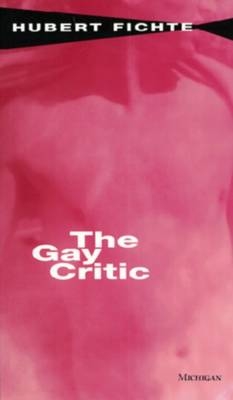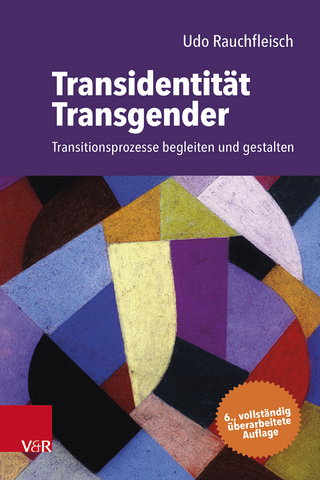
The Gay Critic
Seiten
1996
The University of Michigan Press (Verlag)
978-0-472-10501-4 (ISBN)
The University of Michigan Press (Verlag)
978-0-472-10501-4 (ISBN)
- Titel ist leider vergriffen;
keine Neuauflage - Artikel merken
Germany's celebrated iconoclast traces the history of sexuality in European literature, from archaic Greece to contemporary France.
Before his death from AIDS at age fifty-one, Hubert Fichte was an active presence in contemporary German letters. Novelist, anthropologist, playwright, and polemicist, he was prolific and controversial, an outsider and auto-didact--a powerful public voice who was broadcast on German radio, heard at public lectures, and read in academic and popular literary journals.
"The Gay Critic"--originally published in Germany as "Homosexualitat und Literatur"--offers, both in content and form, a microcosm of Fichte's writings. The overarching concerns are with sexualities and their expression or repression, as evidenced in literary contexts by the producers and the receivers of marginalized, often reviled texts and textual scenes in Western European literature. Fichte uses contemporary points of reference--AIDS, literary mores, the gay voice, the ousted minor traditions--to discuss a wide range of literature.
Fichte's perspective is fresh, unexpected, and uncommonly original as he champions literary untouchables such as the homosexualities conveyed by the "Iliad"; the now- obscure lyric poet von Platen, a polygraphic, homosexual contemporary of Goethe's and the prototype for Aschenbach in Mann's "Death in Venice"; and Jean Genet, on the question of French national socialism. Fichte contends that writing and its reception, its institutionalization and its repressions, are inseparable, even continuous. And, he argues, one's sexualities, libidinal and cultural, are inevitably engaged in either act.
The first volume also considers Sophocles, Petronius, Nizami, Villon, Rabelais, Quevedo, Marlowe, Defoe, Casanova, Stendhal, Flaubert, Strindberg, Lagerlof, Proust, Euclides de Cunha, and Borges. Fichte's prose style defies categorization, comprising a postmodern pastiche that mixes spontaneous criticism and free-form commentary with quotation, academic writing, and dialogue laced with historical and critical reflection. Most of the essays were first read over German radio, and even after revision for publication have remained highly entertaining, accessible and compelling texts.
"The Gay Critic" will appeal to students and scholars in German studies and comparative literature, cultural studies, and gay and lesbian studies. It will also appeal to the general reader interested in provocative, engaging reading.
"Hubert Fichte was a writer quietly and intensely at odds with contemporary German society and literature--as "Half Jew" (according to Nazi law), as Protestant growing up in a Catholic orphanage, and a gay intellectual living in middle-class Hamburg. He wanted to be an outsider but instead of being sentimental about what others would call a life of the margins he made it a central place from which he observed others and his own consciousness, critically and with the highest perception." --Peter Demetz, Yale University
Before his death from AIDS at age fifty-one, Hubert Fichte was an active presence in contemporary German letters. Novelist, anthropologist, playwright, and polemicist, he was prolific and controversial, an outsider and auto-didact--a powerful public voice who was broadcast on German radio, heard at public lectures, and read in academic and popular literary journals.
"The Gay Critic"--originally published in Germany as "Homosexualitat und Literatur"--offers, both in content and form, a microcosm of Fichte's writings. The overarching concerns are with sexualities and their expression or repression, as evidenced in literary contexts by the producers and the receivers of marginalized, often reviled texts and textual scenes in Western European literature. Fichte uses contemporary points of reference--AIDS, literary mores, the gay voice, the ousted minor traditions--to discuss a wide range of literature.
Fichte's perspective is fresh, unexpected, and uncommonly original as he champions literary untouchables such as the homosexualities conveyed by the "Iliad"; the now- obscure lyric poet von Platen, a polygraphic, homosexual contemporary of Goethe's and the prototype for Aschenbach in Mann's "Death in Venice"; and Jean Genet, on the question of French national socialism. Fichte contends that writing and its reception, its institutionalization and its repressions, are inseparable, even continuous. And, he argues, one's sexualities, libidinal and cultural, are inevitably engaged in either act.
The first volume also considers Sophocles, Petronius, Nizami, Villon, Rabelais, Quevedo, Marlowe, Defoe, Casanova, Stendhal, Flaubert, Strindberg, Lagerlof, Proust, Euclides de Cunha, and Borges. Fichte's prose style defies categorization, comprising a postmodern pastiche that mixes spontaneous criticism and free-form commentary with quotation, academic writing, and dialogue laced with historical and critical reflection. Most of the essays were first read over German radio, and even after revision for publication have remained highly entertaining, accessible and compelling texts.
"The Gay Critic" will appeal to students and scholars in German studies and comparative literature, cultural studies, and gay and lesbian studies. It will also appeal to the general reader interested in provocative, engaging reading.
"Hubert Fichte was a writer quietly and intensely at odds with contemporary German society and literature--as "Half Jew" (according to Nazi law), as Protestant growing up in a Catholic orphanage, and a gay intellectual living in middle-class Hamburg. He wanted to be an outsider but instead of being sentimental about what others would call a life of the margins he made it a central place from which he observed others and his own consciousness, critically and with the highest perception." --Peter Demetz, Yale University
| Erscheint lt. Verlag | 30.10.1996 |
|---|---|
| Reihe/Serie | The Body in Theory: Histories of Cultural Materialism |
| Übersetzer | Kevin Gavin |
| Verlagsort | Ann Arbor |
| Sprache | englisch |
| Maße | 146 x 241 mm |
| Gewicht | 700 g |
| Themenwelt | Geisteswissenschaften ► Psychologie ► Sexualität / Partnerschaft |
| Geisteswissenschaften ► Sprach- / Literaturwissenschaft ► Anglistik / Amerikanistik | |
| Geisteswissenschaften ► Sprach- / Literaturwissenschaft ► Literaturwissenschaft | |
| Sozialwissenschaften ► Soziologie ► Gender Studies | |
| ISBN-10 | 0-472-10501-9 / 0472105019 |
| ISBN-13 | 978-0-472-10501-4 / 9780472105014 |
| Zustand | Neuware |
| Haben Sie eine Frage zum Produkt? |
Mehr entdecken
aus dem Bereich
aus dem Bereich
Transitionsprozesse begleiten und gestalten
Buch | Softcover (2024)
Vandenhoeck & Ruprecht (Verlag)
35,00 €
Wege aus dem Chemsex-Konsum bei MSM
Buch | Softcover (2022)
Psychiatrie Verlag
25,00 €
die wichtigsten Konzepte, Tools und Interventionen
Buch | Softcover (2023)
Vandenhoeck & Ruprecht (Verlag)
25,00 €


